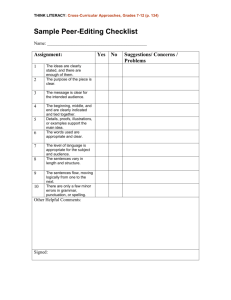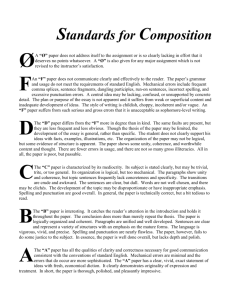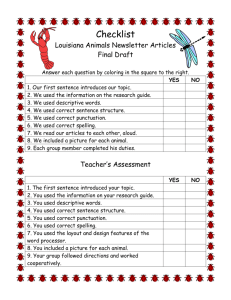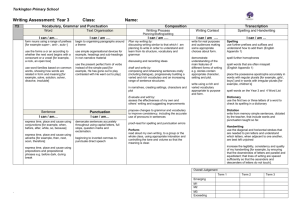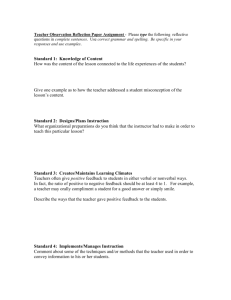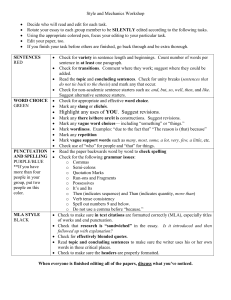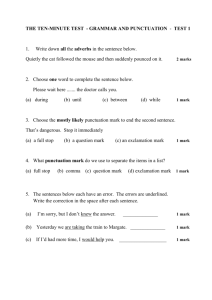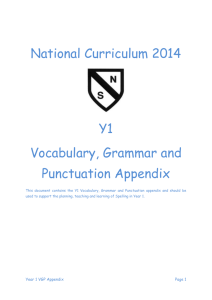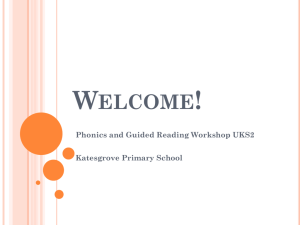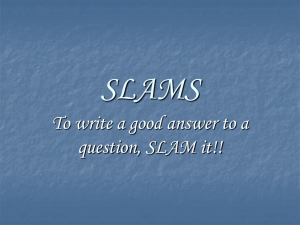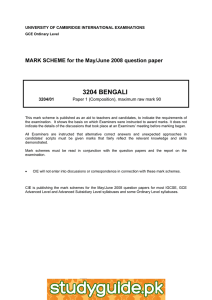Religious Education VCOP Placemat
advertisement
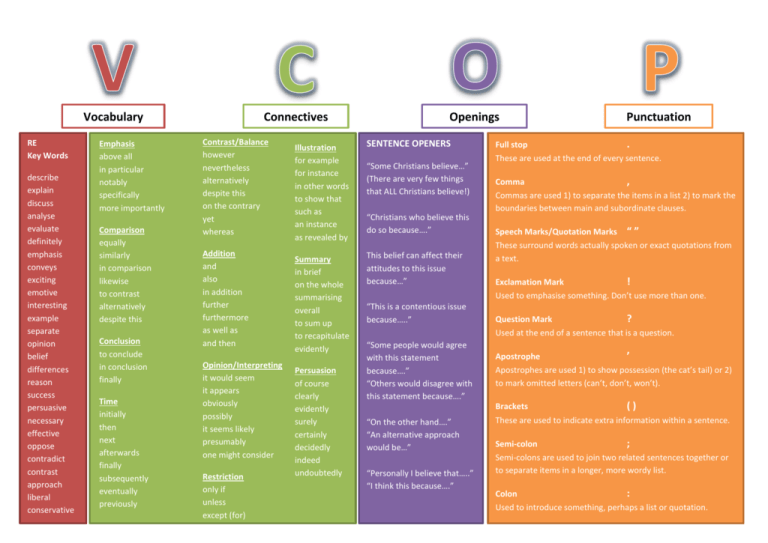
Vocabulary RE Key Words describe explain discuss analyse evaluate definitely emphasis conveys exciting emotive interesting example separate opinion belief differences reason success persuasive necessary effective oppose contradict contrast approach liberal conservative Emphasis above all in particular notably specifically more importantly Comparison equally similarly in comparison likewise to contrast alternatively despite this Conclusion to conclude in conclusion finally Time initially then next afterwards finally subsequently eventually previously Connectives Contrast/Balance however nevertheless alternatively despite this on the contrary yet whereas Addition and also in addition further furthermore as well as and then Opinion/Interpreting it would seem it appears obviously possibly it seems likely presumably one might consider Restriction only if unless except (for) Illustration for example for instance in other words to show that such as an instance as revealed by Summary in brief on the whole summarising overall to sum up to recapitulate evidently Persuasion of course clearly evidently surely certainly decidedly indeed undoubtedly Openings SENTENCE OPENERS “Some Christians believe…” (There are very few things that ALL Christians believe!) “Christians who believe this do so because….” This belief can affect their attitudes to this issue because…” Full stop Punctuation . These are used at the end of every sentence. Comma , Commas are used 1) to separate the items in a list 2) to mark the boundaries between main and subordinate clauses. Speech Marks/Quotation Marks “ ” These surround words actually spoken or exact quotations from a text. Exclamation Mark ! Used to emphasise something. Don’t use more than one. “This is a contentious issue because…..” Question Mark ? Used at the end of a sentence that is a question. “Some people would agree with this statement because….” “Others would disagree with this statement because….” Apostrophe ’ Apostrophes are used 1) to show possession (the cat’s tail) or 2) to mark omitted letters (can’t, don’t, won’t). Brackets “On the other hand….” “An alternative approach would be…” “Personally I believe that…..” “I think this because….” () These are used to indicate extra information within a sentence. Semi-colon ; Semi-colons are used to join two related sentences together or to separate items in a longer, more wordy list. Colon : Used to introduce something, perhaps a list or quotation. To improve your writing you must ensure: Spelling Strategies Break it into sounds (d-i-a-r-y) What you are writing is appropriate for PALL (Purpose Audience Language Layout). Sentences always start with a capital letter. Sentences always end with a full stop, question mark or exclamation mark. Vocabulary is varied – choose interesting words – use a thesaurus. People, places and titles have capital letters e.g. Catherine, York, Kit-Kat. A variety of sentences are used – simple, compound and complex. Simple – The ship sailed away. Compound – The ship sailed away and the blue sea sparkled in the sun. Complex – Sailing into the distance, the ship disappeared on the horizon. Writing is organised into paragraphs – start with a topic sentence and use the 3 ‘T’s rule. You should start a new paragraph when there is a shift of topic, viewpoint or time. Time – Finally, we all gathered together to sing around the camp fire. Topic – Another factor to consider before travelling is... Talk – “I’m not sure you should be doing that.” “Why not?” asked the pupil. Details are included by using adjectives, fact and opinions. Spelling is accurate – use a dictionary. A variety of punctuation has been used (. , ! ? ‘ “” ; : …). To proof read your work aloud to ensure it makes sense. Break it into syllables (re-mem-ber) Break it into affixes (dis-satisfy) Use a mnemonic (necessary – one collar, two sleeves) Refer to a word in the same family (muscle – muscular) Say it as it sounds (Wed-nes-day) Use analogy (bright, light, night) Common Spelling Mistakes Marking Codes Sp – spelling Pu – punctuation is incorrect and needs checking Additional RE Codes: RT – Religious Teaching BQ – Bible Quote Exp – expression of idea could be clearer/needs re-phrasing PO – Personal opinion Cp – capital letter needed SS – sentence structure needs altering or variation // -- new paragraph pp – poor presentation u – underline TS – Two Sides GD – Greater Depth KW – Key words achievement beautiful because beginning committed commitment convenient definitely environment excellent government grammar grateful until its/it’s weather/whether lose/loose were/where/wear know/no which necessary of/off Common RE Spellings opinion to watch out for: really belief religious separate altar conceive technique angel their/there/they’re Jesus to/too/two
